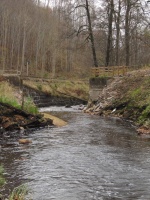Case study:Massadammen-dam removal in River Tabergsån: Difference between revisions
No edit summary |
|||
| Line 60: | Line 60: | ||
|Biological quality elements=Fish, | |Biological quality elements=Fish, | ||
}} | }} | ||
{{Measures | {{Measures}} | ||
}} | |||
{{Hydromorphological quality elements header}} | {{Hydromorphological quality elements header}} | ||
{{End table}} | {{End table}} | ||
Latest revision as of 13:02, 3 February 2015
Project overview
| Status | Complete |
|---|---|
| Project web site | |
| Themes | Fisheries, Habitat and biodiversity, Hydropower, Hydromorphology, Spatial planning |
| Country | Sweden |
| Main contact forename | Peter |
| Main contact surname | Lindvall |
| Main contact user ID | |
| Contact organisation | Länsstyrelsen i Jönköpings län |
| Contact organisation web site | http://projektwebbar.lansstyrelsen.se/vattern/Sv/besoksmal-vatterbackar/tabergsan/Pages/5-massadammen.aspx |
| Partner organisations | |
| Parent multi-site project | |
| This is a parent project encompassing the following projects |
No |
Project summary
Massadammen dam in the South of Jönköping in the River Tabergsån. The dam was built in 1906 for hydropower but the hydro power station was shut down in 1950´s. Because the dam was an obsticle for migrating fish it was decided to remove to improve the conditions for fish. The aim was to build fishpassage, increase the spawning areas for trout and to reduce the regulation and maintenance of the dam. The first plan of the restoration met heavy resistace from the local people because they wanted to maintain the water level. The new plan was made and three dams were built instead of one in the dammed area. The project was good example of the co-operation between different organization (municipality, consultants and local people) to find a goos solution for all parties.
Most of the work was done between early august to late october in 2011. Because of the restoration spawning area for fish increased from 29 000 to 36 000 m2. Also densities of trout increased in the upstream. Densities were measured to be 5 times higher after than before restorations. Total cost of the project was approximately 174 000 euros.
Monitoring surveys and results
Lessons learnt
Image gallery
|
Catchment and subcatchment
Site
Project background
Cost for project phases
Reasons for river restoration
Measures
MonitoringHydromorphological quality elements
Biological quality elements
Physico-chemical quality elements
Any other monitoring, e.g. social, economic
Monitoring documents
Additional documents and videos
Additional links and references
Supplementary InformationEdit Supplementary Information
| ||||||||||||||||||||||||||||||||||||||||||||||||||||||||||||||||||||||||||||||||||||||||||||||||||||||||||||||||||||||||||||||||||||||||||||||||||||||||||||||||||||||||||||||||||




